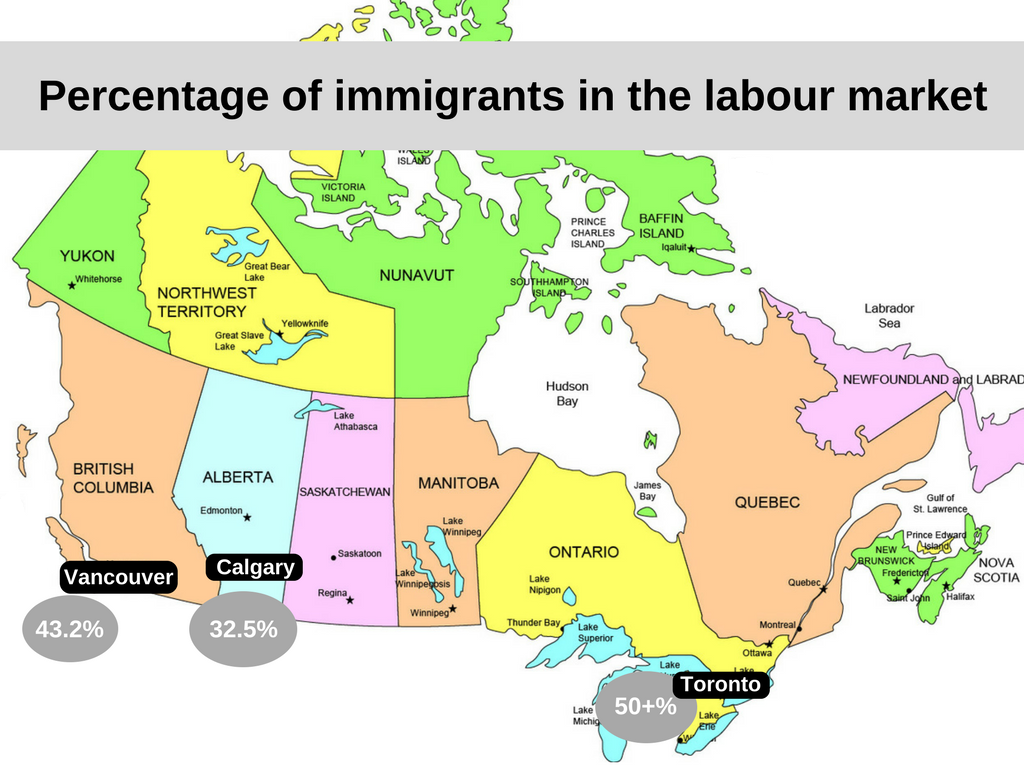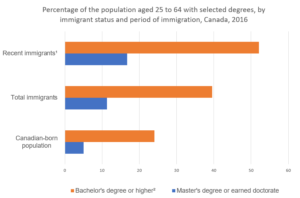Nearly 25% of Canadian workers are immigrants, new data shows
Immigrants have made important gains in Canada’s workforce over the last 10 years and more than 50 per cent have a bachelor’s degree or higher, new statistics from Canada’s 2016 census show.
Released Nov. 29, the figures show that immigrants accounted for 23.8 per cent of Canadian workers in 2016, up from 21.2 per cent in 2006. During that same period, Canada introduced major changes to its immigration system to address skilled labour shortages, namely the introduction of the Express Entry system in 2015.
Statistics Canada defines an immigrant as a person who is, or who has ever been, a landed immigrant or permanent resident.
The workforce gains are even more impressive when looked at regionally: In 2016, immigrants represented half of all workers in the Toronto, Ontario, metropolitan region. Vancouver, British Columbia, had the second-highest proportion of immigrants in its labour force at 43.2 per cent, followed by Calgary, Alberta, at 32.5 per cent.

A key goal of Canada’s Express Entry system is to help offset what is expected to be a decrease in the pool of available labour due to Canada’s aging population. The system classes economic immigrants under three categories: the Federal Skilled Workers Class, the Federal Skilled Trades Class and the Canadian Experience Class. A number of Canadian province’s also have Express Entry-aligned Provincial Nominee Programs designed to address their labour needs.
Since January 2015, 145,368 invitations to apply for Canadian permanent residence have been issued through programs under the Express Entry system. As part of its plan to welcome nearly one million new permanent residents between 2018 and 2020, Canada has established targets to admit 250,000 of these newcomers through the Express Entry system.
In order to enter the Express Entry pool, interested candidates must first establish if they qualify for one of the Express Entry programs. Candidates are assessed based on their skills, work experience, language ability, education, and other personal information.
-
To find out if you are eligible to immigrate to Canada permanently, fill out a free online assessment form.
Job trends
Among employment sectors, Canada’s health care and social assistance industry employed the most Canadians in 2016, followed by the retail sector. More than two million Canadians, or 12.1 per cent of all Canadian workers, were employed in the health and social assistance sector.
Statistics Canada also noted strong growth in the high-skilled computer and information systems professionals group, which now represents 2.1 per cent of total employment in Canada.
In terms of regional distribution, employment in this sector was strongest in Canada’s various “tech hubs” and most notably the Ottawa-Gatineau region, where jobs in the computer and information systems accounted for 4.9 per cent of all employment. Toronto ranked second, with jobs in the computer and information systems constituting 3.7 per cent of total employment.
Higher education
The new census data also revealed that more than 50 per cent of recent immigrants to Canada have a bachelor’s degree or higher. Education is a key qualification under the Express Entry Comprehensive Ranking System (CRS) and international post-secondary students studying in Canada are beginning to benefit from new programs that make it easier for them to integrate into the Canadian labour market after their studies and eventually gain permanent residence.
According to 2016 census, four in 10 immigrants aged 25 to 64 had a bachelor’s degree or higher, compared to 25 per cent of people in same age range who were born in Canada. The number was even higher for recent immigrants who had arrived in the five years prior to the 2016 census, with more than half attaining a bachelor’s degree or higher. Among that group, women were more likely than men to have a bachelor’s degree or higher.

'Recent immigrants' refers to immigrants who first obtained their landed immigrant or permanent resident status between January 1, 2011 and May 10, 2016. The term 'Bachelor's degree or higher' corresponds to the category 'University certificate, diploma or degree at bachelor level or above' in the 'Highest certificate, diploma or degree' classification. Source: Statistics Canada, Census of Population, 2016.
Immigrants are also more than two-times as likely to hold a master’s degree or PhD than the Canadian-born population. Among immigrants aged 25 to 64, 11.3 per cent had a master’s or doctorate degree compared to just five per cent of those born in Canada. The number is even higher among immigrants who arrived in Canada over the last five years, with 16.7 per cent holding a master’s or doctorate degree.
In terms of studies, 81.4 per cent of Canadians aged 24 to 64 had a degree in fields such as education, communications, justice, health and others. Just over 18 per cent graduated with degrees in science, technology, engineering and mathematics (STEM) fields.
Among all young bachelor's degree holders aged 25 to 34 from STEM fields, those from engineering and computer and information sciences were the most likely to work in a labour-market sector closely related to their training, with 7 in 10 working in science and technology occupations.
"These findings suggest that Canada's immigration system, and now its Express Entry system, are paying off in terms of the number of skilled and highly educated immigrants that are being invited to build a new life in Canada," said Attorney David Cohen.
"This is all the more reason for anyone considering Express Entry to get themselves in the pool."
The CRS Calculator
The CRS Calculator allows you to find out what your score would be under the CRS.
To find out if you are eligible to immigrate to Canada permanently, fill out a free online assessment form.
© 2017 CICNews All Rights Reserved
- Do you need Canadian immigration assistance? Contact the Contact Cohen Immigration Law firm by completing our form
- Send us your feedback or your non-legal assistance questions by emailing us at media@canadavisa.com




